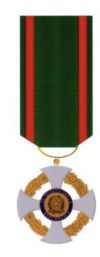Mario Romano
Mario Romano (Naples, July 3, 1978) is a surgeon and ophthalmologist, known for his scientific research and his clinical work in vitreoretinal diseases. He teaches as a Full Professor of Ophthalmology and serves as the Director of the School of Specialization in Ophthalmology at Humanitas University, Milan[1], and is also the Head of the Department of Ophthalmology at Humanitas Gavazzeni-Castelli, Bergamo[2]. Prof. Romano is currently the Scientific Director at the European School for Advanced Studies in Ophthalmology (ESASO), Lugano, Switzerland[3].
| Nationality | |
| Italian | |
| Honors | |
| Knight of the Order of Merit of the Italian Republic | |
| Education | |
| Degree with honors from the University of Naples (100/110 with honors) | |
| Residency in Ophthalmology (50/50 with honors) | |
| PhD in Pharmacology and Molecular Oncology at the University of Ferrara | |
| Fellowship in Retinal Diseases, Massachusetts Eye and Ear Infirmary, Harvard Medical School | |
| Fellowship in Vitreoretinal Surgery, Royal Liverpool University Hospital | |
| Master's in Leadership, Management, and Coordination of Healthcare Facilities | |
| Fields | |
| Ocular surgery with a primary interest in vitreoretinal diseases | |
| Activities | |
| Director of Ophthalmology Residency Program, Humanitas University, Milan | |
| Full Professor of Ophthalmology at Humanitas University, Milan | |
| Director of the Ophthalmology Department at Humanitas Gavazzeni-Castelli, Bergamo | |
| Scientific Director at the European School for Advanced Studies in Ophthalmology (ESASO), Lugano, CH | |
| Notes | |
| Top Italian Scientist in Clinical Sciences [4] |
Early Life and Education
After graduating from high school with top honors, he earned his degree summa cum laude in 2002 from the University of Naples. Following his specialization in Ophthalmology (50/50 with honors) with a thesis titled “Vascular Endothelial Growth Factor and Erythropoietin in Retinal Neovascularization,” he continued his specialized training in vitreoretinal diseases and animal models with a fellowship at the Massachusetts Eye and Ear Infirmary, Harvard Medical School, in 2005-2006 under the supervision of Prof. Donald D’Amico. He also completed a fellowship in vitreoretinal surgery at Royal Liverpool University in 2008 under Prof. David Wong's guidance.
In 2010, he obtained a PhD in Pharmacology and Molecular Oncology at the University of Ferrara with a thesis titled “Coagulation-Balance Gene Predictors Influencing Visual Prognosis in Patients Treated with Photodynamic Therapy for Classic Choroidal Neovascularization Secondary to Age-Related Macular Degeneration.”
In 2018, he also obtained a second-level Master's degree in "Healthcare Management, Direction, and Coordination of Healthcare, Social and Social-Care Structures."
Prof. Romano was habilitated as a Professor in the field of Ophthalmology (02/2015 for associate professorship, 07/2020 for full professorship).
Scientific Publications
He is author of more than 300 international scientific publications in peer-reviewed journals, focusing on translational and clinical aspects of ocular diseases. 5][6][7] Prof. Romano was ranked by Expertscape (2013-2023) as the leading European expert and the second worldwide expert in vitreoretinal surgery. (https://expertscape.com/ex/vitreoretinal+surgery/c/eur) e secondo maggior esperto al mondo (https://expertscape.com/ex/vitreoretinal+surgery)
Patents
He is the inventor of three patents in the field of ocular disease care:
- "Posture Monitoring Device for Patients Treated with Vitrectomy" (No. 0001400522, 24/10/2013)
- "Vitrector" (No. 0001412237, 22/12/2014)
- "Adapter for Ophthalmoscope" (No. 102016000009992, 01/02/2016)
Teaching Positions
Professor Romano teaches at Humanitas University, where he lectures in Medicine and Surgery, MedTech, and directs the School of Specialization in Ophthalmology.
He is also the Director of the second-level annual Master's program in Vitreoretinal Surgery. Additionally, he developed the digital platform ELOS (e-learning ocular surgery), donated to ESASO during the pandemic, where he now serves as Scientific Director.
- Humanitas University. Medicine and Surgery course, Head and Neck.
- Humanitas University. MedTech course, Head and Neck.
- Humanitas University. Director and lecturer of the School of Specialization in Ophthalmology.
- Humanitas University. PhD program in Data Science in Medicine & Nutrition.
- Humanitas University. Director and lecturer of the Second-Level Master's in Vitreoretinal Surgery.
- European School for Advanced Studies in Ophthalmology (ESASO), Lugano CH. Lecturer and Scientific Director.
- University of Naples Federico II. PhD program in Neurosciences.
- University of Naples Federico II. Second-Level Master's in Advanced Studies in Hemophilia and Thrombosis.
- University of Naples Federico II. Lecturer in the Integrated Course in Orthoptic Sciences and Ophthalmological Assistance: Clinical Pathophysiology of the Visual System.
- University of Naples Federico II. Lecturer in the Integrated Course in Orthoptic Sciences and Ophthalmological Assistance: Prevention Profile and Health Services.
- University of Naples Federico II. Lecturer in the Integrated Course in Orthoptic Sciences and Ophthalmological Assistance: Ophthalmological and Orthoptic Semiology.
- University of Naples Federico II. Lecturer in the Integrated Course in Ophthalmological Rehabilitation and Emergencies.
- University of Naples Federico II. Lecturer in the Integrated Course in Ophthalmological Rehabilitation and Techniques in Neuropsychiatric Rehabilitation.
Surgical Activity
Prof. Romano primarily focuses his clinical practice on ocular surgery, with a special interest in complex vitreoretinal diseases. He performs highly complex surgeries on the posterior segment of the eye, including retinal detachment, macular hole, epiretinal membrane, brachytherapy, and proliferative diabetic retinopathy.
Areas of Clinical and Preclinical Research
His main research areas include induced pluripotent stem cells (iPSCs), Müller cells, digitization and virtual reality systems in ophthalmology, intraocular tamponades, toxicity of medical devices, ocular surgery machinery fluid dynamics, and retinal detachment.

